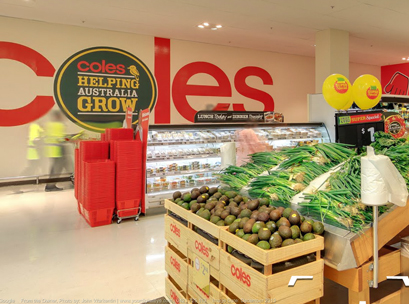 Rising living costs and low wage growth are forcing many households to swap healthy food for cheaper packaged goods in a “disastrous” trend, Coles supermarket boss John Durkan says.
Rising living costs and low wage growth are forcing many households to swap healthy food for cheaper packaged goods in a “disastrous” trend, Coles supermarket boss John Durkan says.
Durkan said soaring power prices in particular are a key constraint on spending for consumers who, as a result, are tightening their belts when it comes to buying food.
“At a time when incomes are not growing much, many households are having to confront large price rises in other areas of everyday living,” the Coles managing director said in a speech at the American Chamber of Commerce on Thursday.
“We are seeing people really being affected by utility prices across the board.
“They are having to choose not only what they are going to feed their family but how much of it, which is disastrous as far as I am concerned.”
Durkan said Coles customers, particularly in lower socio-economic areas, are shifting from buying premium products to the supermarket giant’s own range of private label products, and are spending less on fresh produce and fresh meat.
“Undoubtedly this is happening,” Durkan told reporters.
“In essence, these households are being forced to trade off healthier options for their families.”
Spending on groceries and food items was one of the most common sources of expenditure reduction, according to consumer surveys, despite relatively low food and grocery price inflation over the period, Durkan said.
Research commissioned by Coles on cost of living trends in Australia shows consumers are paying higher prices for utilities, childcare, health and education, which in turn is contributing to cautious spending.
The report, which draws data between 2011 and 2015 from the Australian Bureau of Statistics, the National Centre for Social and Economic Modelling and consumer surveys, notes the cost increases had a greater impact on lower income families than wealthier households.
Durkan also said that while many Australian suppliers support lower prices, some multinational companies, such as Heinz and Coca-Cola, are charging Australians more for their products than in overseas grocery markets.
“This is frustrating to me because often the price differences relate to the same product made and sourced from the same place,” he said.
Coles and rival Woolworths are both pushing to increase their private label product ranges as part of their strategy to cut prices and save margins.
Durkan said Coles will continue to invest in lowering prices but insisted the move would not depress the supermarket giant’s earnings, instead helping to ensure longer term growth.
Access exclusive analysis, locked news and reports with Inside Retail Weekly. Subscribe today and get our premium print publication delivered to your door every week.





